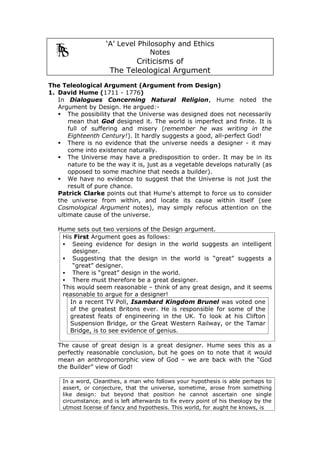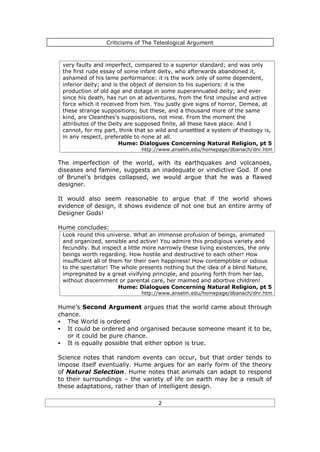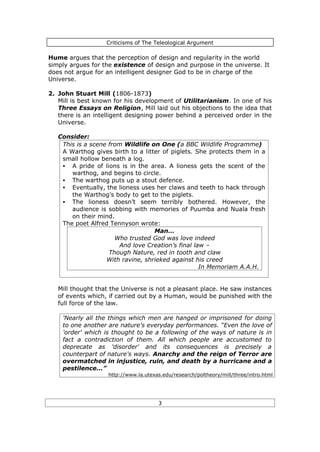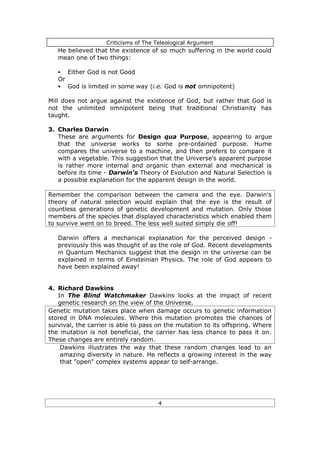Criticisms of the Teleological Argument
- 1. ‘A’ Level Philosophy and Ethics Notes Criticisms of The Teleological Argument The Teleological Argument (Argument from Design) 1. David Hume (1711 - 1776) In Dialogues Concerning Natural Religion, Hume noted the Argument by Design. He argued:- § The possibility that the Universe was designed does not necessarily mean that God designed it. The world is imperfect and finite. It is full of suffering and misery (remember he was writing in the Eighteenth Century!). It hardly suggests a good, all-perfect God! § There is no evidence that the universe needs a designer - it may come into existence naturally. § The Universe may have a predisposition to order. It may be in its nature to be the way it is, just as a vegetable develops naturally (as opposed to some machine that needs a builder). § We have no evidence to suggest that the Universe is not just the result of pure chance. Patrick Clarke points out that Hume's attempt to force us to consider the universe from within, and locate its cause within itself (see Cosmological Argument notes), may simply refocus attention on the ultimate cause of the universe. Hume sets out two versions of the Design argument. His First Argument goes as follows: § Seeing evidence for design in the world suggests an intelligent designer. § Suggesting that the design in the world is “great” suggests a “great” designer. § There is “great” design in the world. § There must therefore be a great designer. This would seem reasonable – think of any great design, and it seems reasonable to argue for a designer! In a recent TV Poll, Isambard Kingdom Brunel was voted one of the greatest Britons ever. He is responsible for some of the greatest feats of engineering in the UK. To look at his Clifton Suspension Bridge, or the Great Western Railway, or the Tamar Bridge, is to see evidence of genius. The cause of great design is a great designer. Hume sees this as a perfectly reasonable conclusion, but he goes on to note that it would mean an anthropomorphic view of God – we are back with the “God the Builder” view of God! In a word, Cleanthes, a man who follows your hypothesis is able perhaps to assert, or conjecture, that the universe, sometime, arose from something like design: but beyond that position he cannot ascertain one single circumstance; and is left afterwards to fix every point of his theology by the utmost license of fancy and hypothesis. This world, for aught he knows, is
- 2. Criticisms of The Teleological Argument very faulty and imperfect, compared to a superior standard; and was only the first rude essay of some infant deity, who afterwards abandoned it, ashamed of his lame performance: it is the work only of some dependent, inferior deity; and is the object of derision to his superiors: it is the production of old age and dotage in some superannuated deity; and ever since his death, has run on at adventures, from the first impulse and active force which it received from him. You justly give signs of horror, Demea, at these strange suppositions; but these, and a thousand more of the same kind, are Cleanthes's suppositions, not mine. From the moment the attributes of the Deity are supposed finite, all these have place. And I cannot, for my part, think that so wild and unsettled a system of theology is, in any respect, preferable to none at all. Hume: Dialogues Concerning Natural Religion, pt 5 http://www.anselm.edu/homepage/dbanach/dnr.htm The imperfection of the world, with its earthquakes and volcanoes, diseases and famine, suggests an inadequate or vindictive God. If one of Brunel’s bridges collapsed, we would argue that he was a flawed designer. It would also seem reasonable to argue that if the world shows evidence of design, it shows evidence of not one but an entire army of Designer Gods! Hume concludes: Look round this universe. What an immense profusion of beings, animated and organized, sensible and active! You admire this prodigious variety and fecundity. But inspect a little more narrowly these living existences, the only beings worth regarding. How hostile and destructive to each other! How insufficient all of them for their own happiness! How contemptible or odious to the spectator! The whole presents nothing but the idea of a blind Nature, impregnated by a great vivifying principle, and pouring forth from her lap, without discernment or parental care, her maimed and abortive children! Hume: Dialogues Concerning Natural Religion, pt 5 http://www.anselm.edu/homepage/dbanach/dnr.htm Hume’s Second Argument argues that the world came about through chance. § The World is ordered § It could be ordered and organised because someone meant it to be, or it could be pure chance. § It is equally possible that either option is true. Science notes that random events can occur, but that order tends to impose itself eventually. Hume argues for an early form of the theory of Natural Selection. Hume notes that animals can adapt to respond to their surroundings – the variety of life on earth may be a result of these adaptations, rather than of intelligent design. 2
- 3. Criticisms of The Teleological Argument Hume argues that the perception of design and regularity in the world simply argues for the existence of design and purpose in the universe. It does not argue for an intelligent designer God to be in charge of the Universe. 2. John Stuart Mill (1806-1873) Mill is best known for his development of Utilitarianism. In one of his Three Essays on Religion, Mill laid out his objections to the idea that there is an intelligent designing power behind a perceived order in the Universe. Consider: This is a scene from Wildlife on One (a BBC Wildlife Programme) A Warthog gives birth to a litter of piglets. She protects them in a small hollow beneath a log. § A pride of lions is in the area. A lioness gets the scent of the warthog, and begins to circle. § The warthog puts up a stout defence. § Eventually, the lioness uses her claws and teeth to hack through the Warthog’s body to get to the piglets. § The lioness doesn’t seem terribly bothered. However, the audience is sobbing with memories of Puumba and Nuala fresh on their mind. The poet Alfred Tennyson wrote: Man… Who trusted God was love indeed And love Creation’s final law – Though Nature, red in tooth and claw With ravine, shrieked against his creed In Memoriam A.A.H. Mill thought that the Universe is not a pleasant place. He saw instances of events which, if carried out by a Human, would be punished with the full force of the law. 'Nearly all the things which men are hanged or imprisoned for doing to one another are nature's everyday performances. “Even the love of 'order' which is thought to be a following of the ways of nature is in fact a contradiction of them. All which people are accustomed to deprecate as 'disorder' and its consequences is precisely a counterpart of nature's ways. Anarchy and the reign of Terror are overmatched in injustice, ruin, and death by a hurricane and a pestilence...” http://www.la.utexas.edu/research/poltheory/mill/three/intro.html 3
- 4. Criticisms of The Teleological Argument He believed that the existence of so much suffering in the world could mean one of two things: § Either God is not Good Or § God is limited in some way (i.e. God is not omnipotent) Mill does not argue against the existence of God, but rather that God is not the unlimited omnipotent being that traditional Christianity has taught. 3. Charles Darwin These are arguments for Design qua Purpose, appearing to argue that the universe works to some pre-ordained purpose. Hume compares the universe to a machine, and then prefers to compare it with a vegetable. This suggestion that the Universe's apparent purpose is rather more internal and organic than external and mechanical is before its time - Darwin's Theory of Evolution and Natural Selection is a possible explanation for the apparent design in the world. Remember the comparison between the camera and the eye. Darwin's theory of natural selection would explain that the eye is the result of countless generations of genetic development and mutation. Only those members of the species that displayed characteristics which enabled them to survive went on to breed. The less well suited simply die off! Darwin offers a mechanical explanation for the perceived design - previously this was thought of as the role of God. Recent developments in Quantum Mechanics suggest that the design in the universe can be explained in terms of Einsteinian Physics. The role of God appears to have been explained away! 4. Richard Dawkins In The Blind Watchmaker Dawkins looks at the impact of recent genetic research on the view of the Universe. Genetic mutation takes place when damage occurs to genetic information stored in DNA molecules. Where this mutation promotes the chances of survival, the carrier is able to pass on the mutation to its offspring. Where the mutation is not beneficial, the carrier has less chance to pass it on. These changes are entirely random. Dawkins illustrates the way that these random changes lead to an amazing diversity in nature. He reflects a growing interest in the way that "open" complex systems appear to self-arrange. 4



